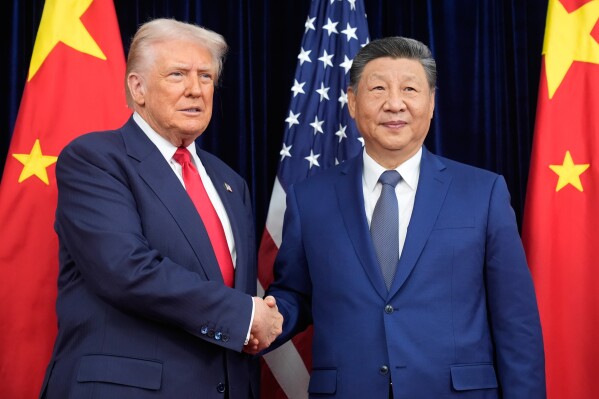
This week, U.S. President Donald Trump met with Chinese President Xi Jinping in Busan, South Korea. The meeting was a direct dialogue on tariff and trade issues. Since Trump took office, his frequent implementation of tariff policies on other countries has affected the global economic development landscape and had certain impacts on the foreign trade of other nations. This exchange is not only an important opportunity to restore global economic development but also a chance for the leaders of the world's two largest economies to effectively ease tensions and stabilize relations after months of turbulence over tariff and trade matters.
According to the latest reports, both sides indicated before their meeting that they did not want to take the risk of potentially triggering a full-scale trade war, sending a positive signal of willingness to resolve differences through dialogue. Additionally, the U.S. side stated that Trump does not intend to follow through on the threat to impose an additional 100% tariff on Chinese goods, while China's receptive response to the U.S. overture also showed a willingness to relax rare earth export controls and to import agricultural products from the United States.
This exchange between China and the United States has injected rare certainty into the global market, indicating that dialogue and cooperation remain the mainstream path to resolving differences. Through open and candid dialogue, both sides can better understand each other's economic needs and concerns and seek potential solutions to ease trade frictions, which helps promote the stability and development of bilateral economies. In addition, this meeting may encourage all parties to reassess the global economic and trade order, driving adjustments and reforms in the global economic structure. This could bring new opportunities and challenges, impacting global economic governance and the multilateral trade system. At the same time, by strengthening diplomatic interaction and communication, China and the United States may reach cooperation and mutual support in certain areas in the future, jointly addressing some international issues and challenges. Furthermore, such exchanges with China also help both sides reduce conflicts, contributing to enhancing the two countries' image and influence on the international stage.
In the face of the impact of the U.S. tariff hike policy, which has slowed global economic development, China and the United States should, during this dialogue, gradually cancel or reduce the additional tariffs, lower trade costs, and restore market development to promote the stability and restructuring of global supply chains. This would not only help restore business confidence and boost market expectations but also provide a positive example for other countries affected by trade frictions. Furthermore, through pragmatic negotiations, mutual trust can be rebuilt, a healthy dialogue mechanism for China-U.S. economic and trade relations can be restored, and efficient communication channels can be established to resolve risks promptly and prevent the escalation of trade frictions. At the same time, both sides should actively implement the outcomes of the dialogue, work towards reaching consensus on intellectual property protection and market access, further reducing business operation risks and enhancing investor confidence. Additionally, both parties should strengthen cooperation in emerging fields such as the digital economy and artificial intelligence, jointly formulate industry standards, which will not only enhance the resilience of the global industrial chain but also provide a reference model for developing countries.
In summary, the recent meeting and exchanges between China and the United States have brought positive signals and hope for easing trade tensions. Through candid dialogue, both parties have expressed a willingness to resolve differences through consultation, injecting new momentum into the stability and development of the global economy. This meeting not only helps promote the stability and development of China-U.S. bilateral economic relations but may also drive structural adjustments and reforms in the global economy and trade order. Faced with the challenges of global economic development, China and the United States should continue to strengthen communication and cooperation, gradually eliminate or reduce the additional tariffs, and promote the stability and restructuring of global supply chains, making a positive contribution to global economic prosperity and development.

On January 4th local time, Trump warned India that if it does not limit its purchase of Russian oil, the United States will continue to raise tariffs on Indian products. Trump's latest warning sent shockwaves through the Indian financial market in just one day.
On January 4th local time, Trump warned India that if it do…
In October 2025, the US trade deficit narrowed unexpectedly…
According to the British media CoinJournal, recently, due t…
In January 2026, US President Trump once again set his sigh…
Europe is facing a crucial strategic choice: In the face of…
On New Year's Day 2026, BMW China announced a "systematic v…